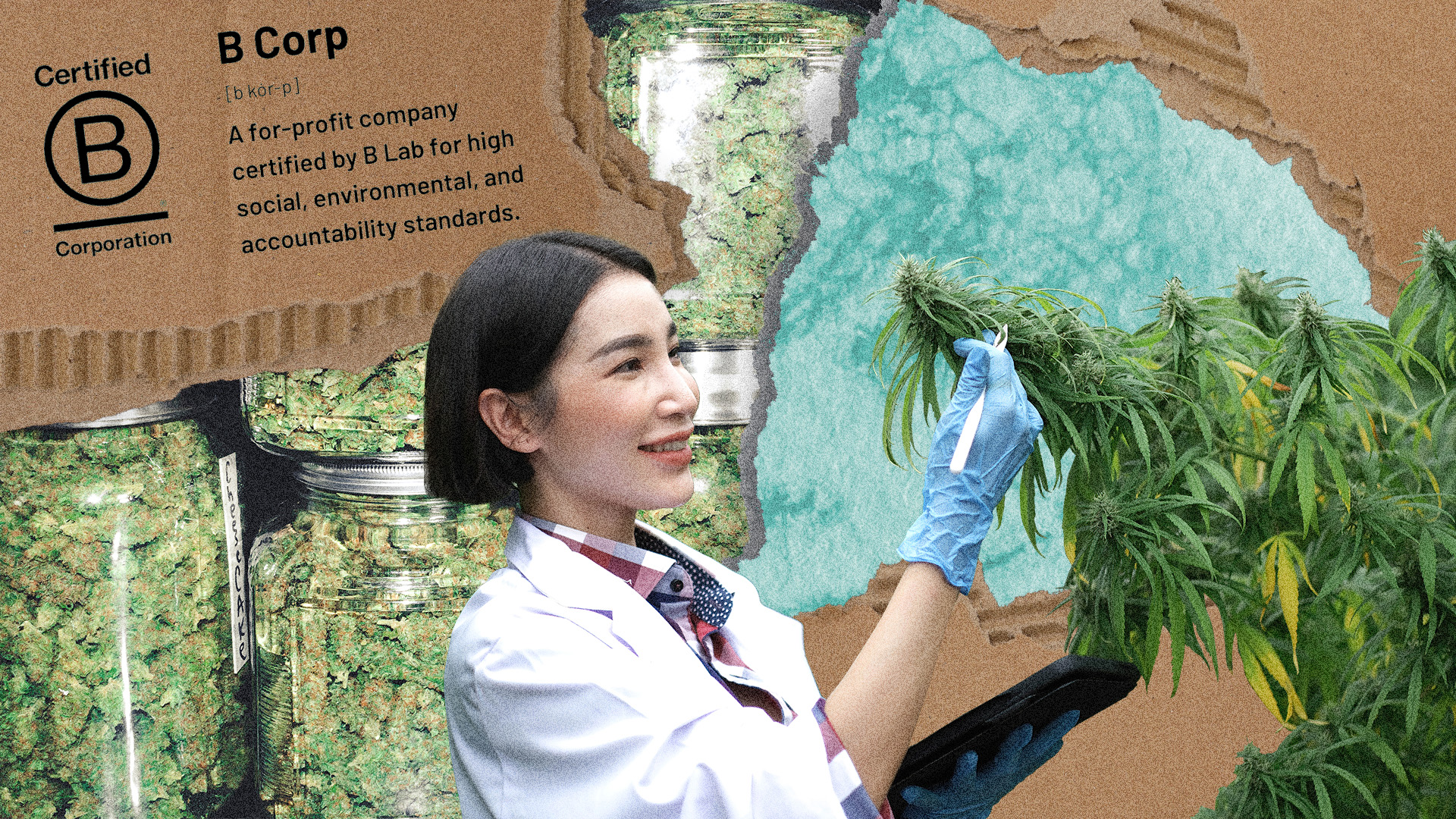The cannabis industry is built on the promise of mending the damage caused by the War on Drugs. As the industry has matured, however, keeping this promise has proved difficult. Despite some states’ best efforts to promote diversity and inclusion through social equity programs — cannabis’ federal illegality means that those who work in the industry remain particularly susceptible to exploitation.
That said, not all cannabis businesses and owners are mustache-twirling villains waiting to exploit workers for profit. Socially conscious cannabis companies who prioritize the environment and give back to their communities are there for consumers willing to put in the time and effort to find them. But what if there was an easier way to highlight these “good” companies?
Believe it or not, a system for identifying “good” companies already exists — just not for cannabis. The B Corp Movement revolutionized the business world by proving that good morals are good for business.
Below, we explain how B Corp Certification works, its shortcomings, and how the cannabis industry could implement a similar system.
What Is A B Corp?
The B Corp movement is built on the idea that businesses should benefit their stakeholders — including the community and environment they operate in — and not just their owners.
The B Lab is the movement’s network of international organizations tasked with unbiasedly deciding which corporations are worthy of receiving “B Corp” (short for Benefit Corporation) certification. This certification indicates that a company has met the B Lab’s rigorous standards for social and environmental practices and that it is committed to continued public accountability and transparency.
Once certified, companies pledge to B Lab that they will become “forces for good” and “consider people and the planet alongside profit”. B-Lab says the value of it’s certification is tri-fold, allowing “…allowing companies to build consumer trust, attract employees and entice investors”. To date, over 6000 Certified B Corporations in more than 80 countries and over 150 industries have taken the pledge, including brands like Kylie Jenner’s 818 Tequila, Aesop skincare, and Ben & Jerry’s.
Why You Should Get Your Medical Marijuana Card
Veriheal has satisfied millions of patients nationwide by giving them access to these benefits
- Larger purchase limits
- Peace of mind
- Enhanced legal protection
- Access to higher potency strains
- Save up to 25% on cannabis purchases
- Skip the line at the dispensary
The success and transformative power of the B-Corp certification system show exactly why the cannabis industry needs to replicate it. That said, the cannabis industry’s version should be wary of repeating the mistakes that put B-Corps once gold-standard certification in danger.
In short, last year, more than 30 B Corps and businesses signed an open letter to B Lab protesting the certification of Nespresso — pointing to the coffee giant’s “abysmal track record on human rights from child labor and wage theft to abuse of factory workers”. The signers accused B Lab of allowing multinational companies to “do the bare minimum” to gain certification. For a system like B Corp whose power comes from authenticity and transparency, a mistake like this could undermine the entire operation.
Imagining A B Corp-Type Certification For Cannabis
As mentioned above, there is currently no B Corp equivalent for the cannabis industry. The closest the industry currently has is the organization Cannabis Doing Good (CDG).
CDG primarily acts as a consulting firm offering companies training in anti-racism, equitable hiring practices, and community outreach. Its website highlights some of its clients, acting as a sort of signifier of cannabis companies prioritizing social equity and social responsibility. However, without transparency into the actual actions these companies are taking, CDG falls short of matching B Corp Certification as a signifier of a “good” company — mostly by design, of course, as CDG is a consulting firm first and foremost.
Taking into account what’s currently available in the cannabis space with CDG and using the blueprint for a certification system provided by B Lab, let’s envision a “good” cannabis company signifier called Cannabis Care (CC) certification.
Similar to B Corp, a group of social justice, health, and cannabis industry organizations would be tasked with unbiasedly deciding who gets certification. Taking into account the unique issues caused by cannabis’ federal illegality, companies looking to earn CC certification would need to meet the following standards:
- Uphold respect for labor rights by sourcing cannabis and cannabis products from manufacturers and growers who pay workers a fair wage, create a safe working environment, and follow Diversity, Equity and Inclusion (DEI) best practices.
- Uphold respect for the planet by sourcing cannabis and cannabis products from manufacturers and growers who utilize sustainable and environmentally friendly practices.
- Uphold respect for the cannabis industry’s inherent mission to mend the damage inflicted by the War on Drugs by acknowledging its continued effects and investing in community outreach and education.
A system like CC certification would be an invaluable addition to a cannabis space lacking labor and environmental regulation. By allowing consumers to easily identify which cannabis companies are looking out for the community at large the cannabis industry might yet be able to live up to social movements which allow it to exist today.
Author, Share & Comments
















